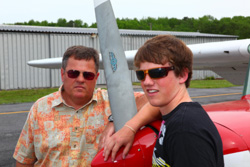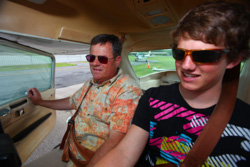 Randall Colthorpe flies Norfolk Southern Railroad executives all over the East Coast. He has been a flight instructor for many years and administers biennial flight reviews.
Randall Colthorpe flies Norfolk Southern Railroad executives all over the East Coast. He has been a flight instructor for many years and administers biennial flight reviews.
His most recent aviation challenge lies closer to home.
In home, actually. Colthorpe is teaching his 17-year-old son Ellis to fly.
Ellis caught the aviation bug as a child, accompanying Randall on trips shuttling doctors throughout the Virginia Beach, Va., area. Randall sometimes let Ellis sit in the cockpit.
Ellis pestered Randall for years to teach him to fly. Last May, Randall recruited a friend to give Ellis his first lesson while Randall renewed his flight instructors certificate. But for nearly all the approximately 15 lessons since, mostly on weekends, it’s been father and son together in a Cessna 152 at Hampton Roads Executive Airport in Norfolk.
The first time Ellis soloed, in January, Randall waited on the taxiway.
“He looked scared and nervous because he was letting his son fly by himself, but he was excited because he knew how much it meant to me. When it was over, he was proud of me. It was such a good feeling,” Ellis said. “It was pretty much a dream come true to be up there by myself.”
In a separate interview, Randall used similar language. “It’s quite a feeling of pride and courage to see your son go fly off by himself,” he said. “To give him the keys to the plane and say, ‘Let me see three landings and takeoffs’ — it’s quite a feeling.”
Randall knew that Ellis was ready to solo once he had “the technical knowledge, manual dexterity, and understanding of airport traffic and using the radio,” he said. “It becomes pretty obvious in a student’s career if they have it or if they don’t. I’ve had students who’ve never soloed. They didn’t have what it took to do it safely, in my opinion.”
The first solo flight “was nerve wracking because … it was a lot of responsibility placed in my hands,” Ellis said. “I was just worried I would do something wrong, but after my first takeoff and landing, my nerves calmed down, and the rest of the flight wasn’t as hard.”
Ellis came naturally to flight by being around his dad so often at the airfield, Randall said. “Once it gets its claws into you, there’s no way out of it,” he said. “When you have that kind of history, you can’t help but generate a love for aviation.”
That comment, however, relates not to Ellis’s early fascination with aviation, but to Randall’s own. His late father Sidney flew combat missions in World War II, Korea, and Vietnam. Sidney’s brother Ken has been an AOPA member for 66 years and flew as a civilian pilot for the military in World War II and, later, for commercial airlines and companies.
While he and Ellis always have had a good relationship, the experience of teaching him engendered in the boy “a greater respect for his father” and “a better understanding of what I do for a living,” Randall said.
“It is good to have an activity where I can command 100 percent of his attention,” he explained. “I spend quality time with him driving to and from the airport. Once in the airplane, we focus on the mission. I treat him in a professional manner and always keep our lessons safe and fun. He understands the seriousness of his actions and the importance of safety. Every lesson is a growing and positive experience.”
Randall does not charge Ellis for the lessons, but makes his son pay for the airplane rental to instill an appreciation for the investment involved. Ellis concurs. He plows about 95 percent of his income from mowing lawns and cleaning a golf course into his passion for flight.
 “It means a lot more to me that I’m paying for it myself,” Ellis said. “For the whole hour, hour and a half, that I’m in the air, I’m getting my money’s worth.”
“It means a lot more to me that I’m paying for it myself,” Ellis said. “For the whole hour, hour and a half, that I’m in the air, I’m getting my money’s worth.”
Ellis hopes to get his pilot certificate this summer. He already is studying for it and taking practice tests online. He has to do two more supervised solos. Then, the two will work on cross-country training: navigating between two points “using pilotage, dead reckoning, and the airplane’s avionics,” Randall said. “You go beyond your comfort zone. … That’s what aviation is: going from Point A to Point B and using the airplane as a tool for transportation.”
Ellis’s good friend, Matt Dutzer, also is learning to fly. The two study together and push each other to succeed. Dutzer earned his certificate in January. Achieving the same will be “a pretty awesome experience,” Ellis said.
Almost as good as learning under Randall’s tutelage.
“The experience of flying with my dad has been great,” Ellis said. “Ever since we started, I have felt closer to him, since we now have something in common. … I like being able to tell people that I am learning to fly from my father, and people in the flying community think it is a really good thing.”
The airborne, father-son experience may just be starting.
Asked about future plans, Ellis said that he hopes to attend Virginia Tech “and then I would like to get a job in flying. I’d like to work with my dad, flying corporate airplanes.”


